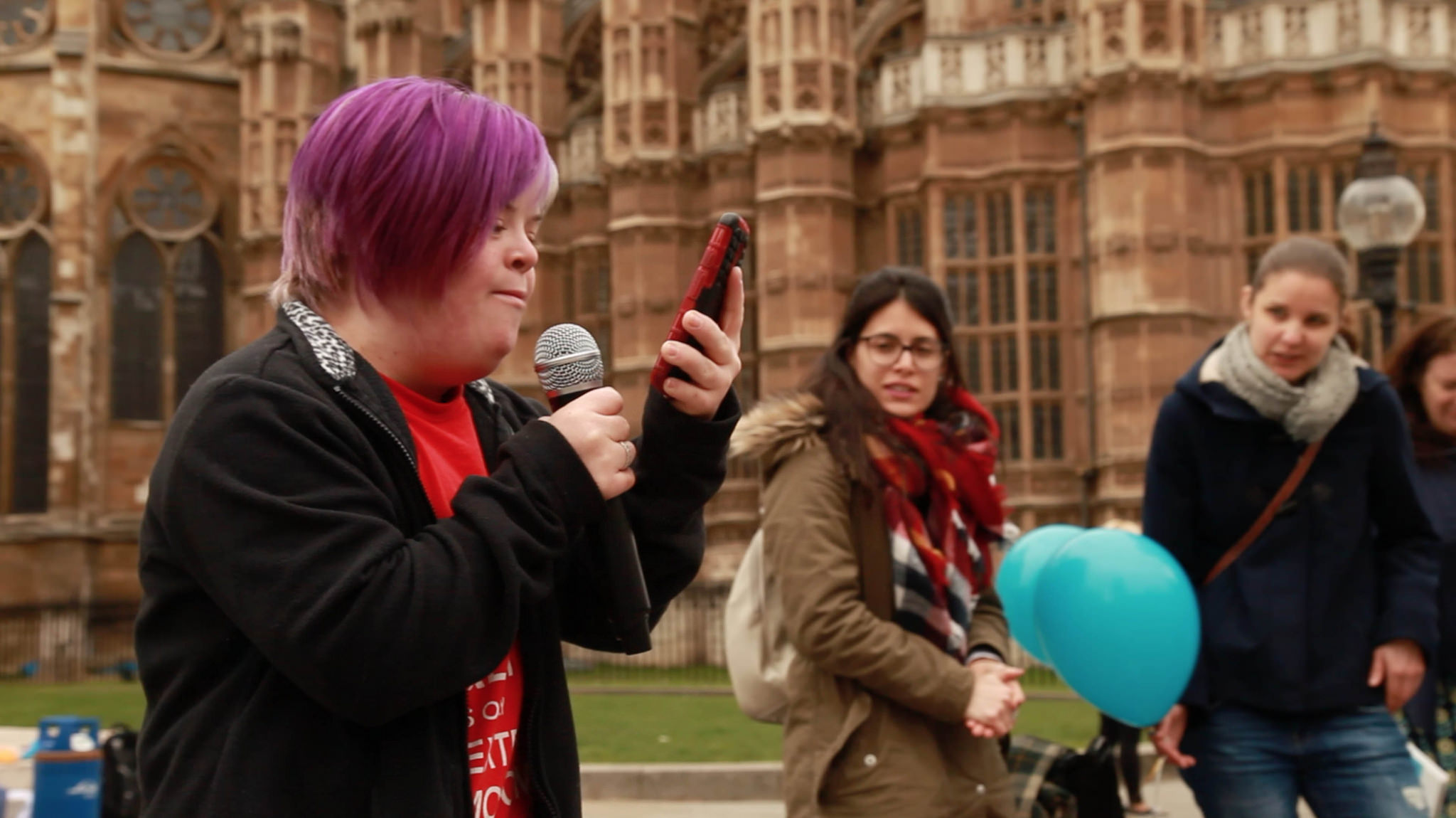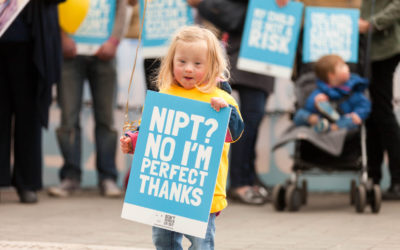A video of 20-year old Heidi Crowter’s speech at this week’s Don’t Screen Us Out demonstration outside Parliament has gone viral online, clocking up over 150,000 organic views on Facebook since it was released on Tuesday.
Heidi, who works in a Hair Salon in Coventry, talked about the love, happiness, and potential of the lives of people with Down’s syndrome, and told Health Secretary Jeremy Hunt, “don’t screen us out, work with us so that we can make a society that treats everyone with the dignity, and respect, and compassion, and love that we all deserve”.
After the demonstration, those in attendance walked to the Department of Health, where Heidi personally handed a copy of the campaign message to be delivered to Jeremy Hunt.
Heidi was one of many voices at the demonstration shown in another video released on Wednesday night, including parents of children with Down’s syndrome and advocacy group members.
People attended the day to support the Don’t Screen Us Out campaign, which calls for the delay of the implementation of a new form of non-invasive prenatal testing, ‘cell-free DNA’ (cfDNA), which would lead to 102 more babies with Down’s syndrome being detected annually. Due to the lack of support and information given to parents who receive a diagnosis of foetal disability, 90% of babies with Down’s syndrome are aborted each year. This means that if cfDNA were introduced today, 92 more children with Down’s syndrome would be terminated every year, a 13% decline in the birth rate. This would compound negative discrimination against those living with Down’s syndrome and their families.
The Don’t Screen Us Out campaign is calling for reforms to be made first – including the provision of non-directional medical support and balanced information for parents whose child is diagnosed with foetal disability – before cfDNA is implemented. This would mean that introducing new methods of detecting babies with Down’s syndrome in the womb might not lead to the screening out of lives that have such potential for great joy in themselves and the lives of those around them.
Heidi’s message to Jeremy Hunt:
“My name is Heidi, I’m 20 years old, l work in a hair salon, I have Down’s syndrome, and my life is just as important and just as joyful as anyone else’s.
When parents are told their baby has a disability, they don’t always get the support and information they need, and are not told that their little one can thrive and blossom.
They are not told the potential this new human life has, and how much love and happiness they can have and bring to the lives of their family and society.
The Government are considering introducing another test that could lead to fewer children with Down’s syndrome being born every year.
This is because our society, and the health services, don’t realise that children with disabilities are part of the diversity and richness of life.
Parents need to be shown the support and given help to have and look after their babies instead of being faced with a hopeless choice.
I’m here because I believe we are all equally valuable, and should be equally valued.
Mums and Dads should be given the help they need so that they don’t see a disabled baby as a worry but the beginning of their happy adventure.
Jeremy Hunt, don’t screen us out, work with us so that we can make a society that treats everyone with the dignity, and respect, and compassion, and love that we all deserve.”
ENDS
VIDEO ACCESS
- Women with Down’s Syndrome’s message to Jeremy Hunt and the Government outside Parliament
- YouTube link for embedding: https://www.youtube.com/watch?v=rytvVE0wzBU
- Facebook link for embedding: http://bit.ly/1VDSVEa
- Second demonstration video release: People with Down’s Syndrome & families powerful message to the Government
- YouTube link for embedding: https://www.youtube.com/watch?v=PICqpPREZOU
- Facebook link for embedding: http://bit.ly/1pkxdXa
PHOTO ACCESS
All files can be downloaded and can be used for media coverage of event:
https://www.flickr.com/photos/dontscreenusout/with/25973896243/
For more information on the cfDNA screening proposals and concerns about them see the campaign briefing on our website, and see our more detailed FAQ.



